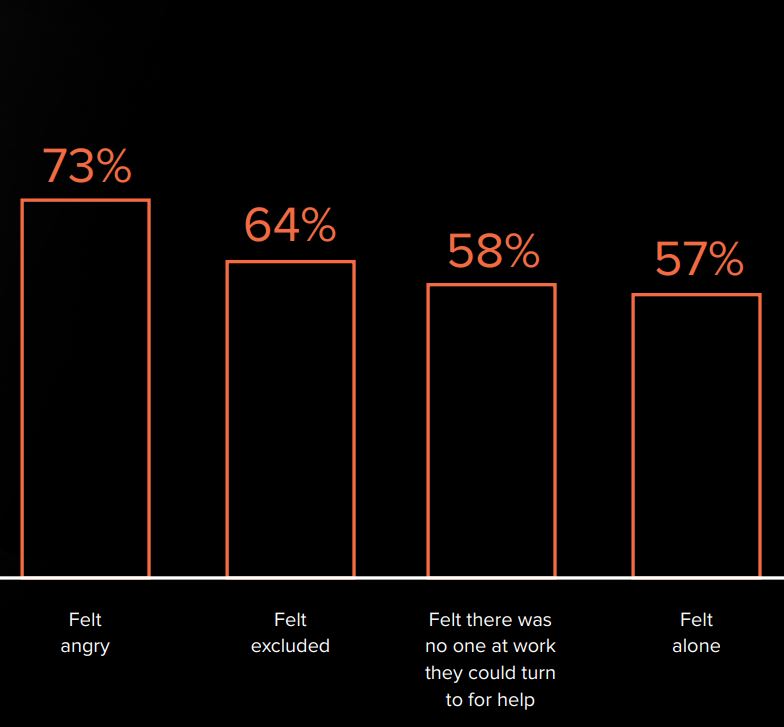Study: 92% want to work at companies with a focus on empathy and DE&I
Is empathy the key to creating diverse and inclusive workplaces?
Why You Should Care
14% of US workers have been unfairly treatment at work because of their race or ethnicity in the past year, according to SHRM.
Workplace racial discrimination has a knock-on effect on both employee wellbeing and productivity.
But how can empathy help to create diverse and inclusive cultures and workplaces?
Employers – and particularly HR teams – talk a lot about fostering diversity, equity and inclusion (DE&I) in the workplace.
However, it is clear that significantly more work needs to be done to actually achieve concrete change.
Research by the Society for Human Resource Management (SHRM) found that racial injustice and discrimination remains commonplace in US workplaces.
Of 1,313 US workers surveyed for SHRM’s ‘The cost of racial injustice’ report, 14% said they had been treated unfairly in the workplace due to race or ethnicity in the past year. This rose to 19% over the past five years and to 32% for Black workers in 2020.
In addition, 72% of those surveyed reported that they had been discriminated against for their race or ethnicity up to five times in the past year; while 2% noted that they been racially mistreated 100 times over the past 12 months.
Unsurprisingly, this discriminatory workplace culture has an extremely negative impact on the employee wellbeing.

Credit: SHRM’s ‘The cost of racial inequality’ report.
The business case for inclusive workplaces
Racial injustice and its negative impact on employee wellbeing also had a knock-on effect on staff’s productivity. Remember, happy, empowered employees are the most productive.
SHRM’s survey found that, as a result of unfair treatment at work, 45% put less effort into their work than they could have, while 35% took longer to complete their work, 25% took extra or longer breaks and 21% arrived late to work or left early without their line manager’s approval.
In addition, SHRM found that 48% called in sick or missed work because of racial discrimination. This absenteeism is estimated to have cost US employers up to $54.1bn in the past 12 months, while lost productivity in general cost businesses $58.7bn last year.
Further to this, SHRM noted that racial discrimination and injustice led to many deciding to leave their jobs.

Credit: SHRM’s ‘The cost of racial inequality’ report.
This DE&I-related turnover has cost US businesses $171.9bn over the past five years, according to SHRM.
The need to focus on empathy
SHRM believes that a major ways for employers to properly embrace DE&I is by creating empathetic workplaces.
SHRM chief knowledge officer Alex Alonso noted: “Empathy is a key lever in driving toxicity out of the organization by remaining open to other perspectives and fostering a climate where people can share transparently to move together forward.
“This means finding leaders who create strong cultures, motivate employees and understand diversity.”
It is clear, according to a second report by SHRM titled ‘Empathy: DE&I’s missing piece’, that empathetic organizations do better at attracting talent.
92% of the almost 2,500 US employees surveyed said if they were actively seeking a new job, they would look for organizations that demonstrated empathy.
In addition, employees working at empathetic organizations were 3.75 more likely to recommend their workplace to job seekers they know. They were also 3.25 more likely to recommend family members, friends or colleagues for roles at their empathetic employer.
Therefore, SHRM concludes that “organizations that make empathy a top priority — through action — will cultivate the healthiest and most attractive workplaces for people to achieve their full potential. In the process, empathetic organizations will boost the bottom line.”
Sign up to the UNLEASH Newsletter
Get the Editor’s picks of the week delivered straight to your inbox!

Chief Reporter
Allie is an award-winning business journalist and can be reached at alexandra@unleash.ai.
